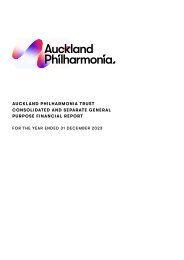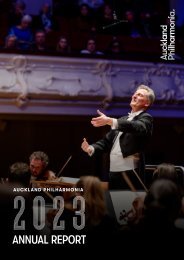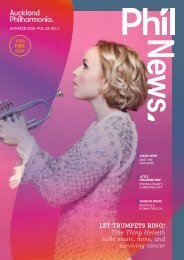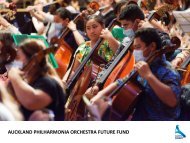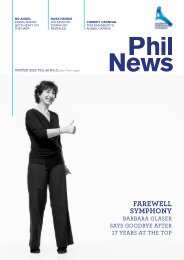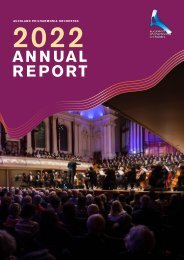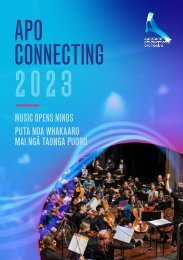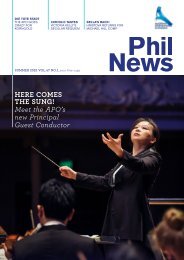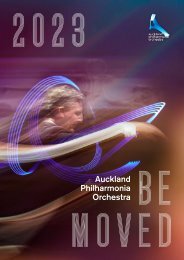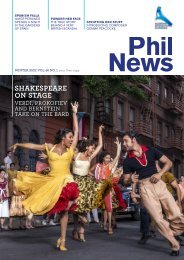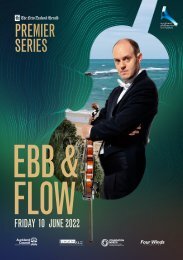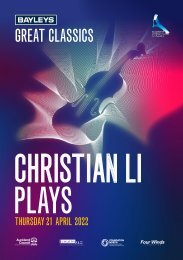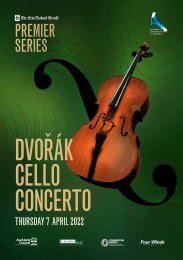Create successful ePaper yourself
Turn your PDF publications into a flip-book with our unique Google optimized e-Paper software.
Pushing the<br />
Boundaries<br />
With the world premiere of Gary<br />
Kulesha’s Oboe Concerto around<br />
the corner, Richard Betts talks to<br />
the composer and <strong>APO</strong> Principal<br />
Oboe Bede Hanley about this<br />
exciting new work.<br />
8<br />
Bede Hanley has turned a little pale.<br />
“Now you’ve got me worried,” says the<br />
<strong>APO</strong>’s Principal Oboe.<br />
That wasn’t the intention. We’re<br />
actually here to talk about his upcoming<br />
performance of Gary Kulesha’s Oboe<br />
Concerto, a work commissioned by<br />
Hanley and the <strong>APO</strong> that receives its<br />
world premiere this October.<br />
Kulesha is a big deal, and so is any<br />
commission from the composer widely<br />
considered to be Canada’s best. He<br />
doesn’t accept many.<br />
“When you’re young you have to take<br />
the commissions that come your way,”<br />
says Kulesha from his home in Toronto.<br />
“Now I try to figure out what I want to do<br />
then find someone who’s interested in<br />
committing to it. But in this case, Bede<br />
came to me and I was thrilled.”<br />
The pair know each other from way<br />
back. In 2011 Kulesha wrote Zephyrs, a<br />
work for two oboes and cor anglais,<br />
which was premiered by Bede and his<br />
colleagues in the Canadian Oboe Trio.<br />
At 24 minutes, the concerto is twice<br />
the length of Zephyrs, and one of<br />
Kulesha’s more substantial works.<br />
“It was a challenge, because<br />
concertos are difficult to sustain<br />
intelligently,” he says.<br />
They are generally difficult to play, too;<br />
the ultimate expression of the soloist’s art.<br />
“My take on that is: if it’s impossible,<br />
that’s my problem. If it’s really, really, really<br />
hard, that’s not my problem.”<br />
And this piece? It’s by all accounts<br />
really, really, really hard.<br />
“The solo part is just fantastically<br />
difficult,” the composer admits cheerily.<br />
“Because Bede encouraged me<br />
to think so far outside the<br />
box I thought, ‘You know<br />
what, I’m going to write<br />
this kind of theoretical<br />
cadenza, send it to him<br />
and see what he says’.”<br />
The oboist’s<br />
response went something<br />
along the lines of, “I can’t<br />
play it yet. But I will.”<br />
As far as Bede is concerned,<br />
GARY KU LESHA<br />
the work contributes to the natural<br />
evolution of his instrument’s repertoire.<br />
“When the Strauss Oboe Concerto<br />
was written [in 1945], people said it<br />
couldn’t be done. Now any talented high<br />
school student can play it. With this new<br />
piece, it’s my job to figure it out. Our level<br />
needs to move on. So yeah, it’s really<br />
hard, but that’s kind of the point.”<br />
While it’s difficult, the concerto won’t<br />
be a display piece padded with empty<br />
virtuosity where the music ought to be.<br />
According to the composer, the<br />
concerto has a solid symphonic<br />
backbone, and fans of Kulesha’s<br />
music will recognise some of<br />
his compositional signatures.<br />
“I’ve always been a very<br />
rhythmic composer,” he says.<br />
“And I consider lyricism to be<br />
absolutely crucial; whether<br />
you’re writing tonal music or<br />
music that is less tonal,<br />
melodic writing is critical. To me,<br />
you can’t create convincing long<br />
pieces just out of texture.”<br />
IMAGE: ADRIAN MALLOCH



